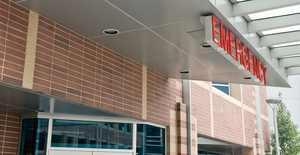Key points
- Urgent care clinics are primarily staffed by physicians, with 94% of clinics employing at least one full-time doctor.
- The physicians at urgent care centers typically specialize in family practice and emergency medicine.
- Non-physician providers such as nurse practitioners or physician assistants are also common in urgent care clinics.
- Additional clinical staff in urgent care clinics may include x-ray technicians, nurses, medical assistants, and front desk staff.
- Regardless of who patients see at an urgent care clinic, they can be assured that they are in good hands as all staff members are fully qualified to treat a variety of injuries and ailments.

Urgent care clinics offer a wide range of highly-trained medical staff, some with certifications and degrees that you may not yet be familiar with. If you’re thinking of visiting an urgent care center for the first time, you may be curious about who you can expect to see on your visit.
Urgent care clinics are structured differently than primary care offices and hospitals, but they staff many of the same people. In our previous posts, we’ve answered the following questions:
- What are urgent care clinics?
- When should you go to an urgent care clinic?
Below, we will answer the equally important question: who is going to treat you when you arrive?
Physicians in Urgent Care
Urgent care clinics are primarily physician-led facilities, with 94% of urgent care clinics across the country employing at least one full-time physician. In fact, many urgent care clinics are even owned by physicians. Some states, including California, Texas, Ohio, Iowa, Colorado, New York, Illinois, and New Jersey, have even passed laws that require urgent care clinics to be owned directly by physicians instead of corporations.
The physicians that work at urgent care centers typically specialize in family practice and emergency medicine. The physician that you see will either be a Doctor of Medicine (MD) or a Doctor of Osteopathic Medicine (DO). These two types of doctors have very similar training and educational backgrounds and, legally, they have the same ability to diagnose health conditions, administer treatment, prescribe medications, and perform surgery. However, an osteopathic physician has additional training that emphasizes the musculoskeletal system and its relationship to different diseases and conditions. Doctors with an MD degree practice allopathic, or conventional Western medicine.
Related: Will I see a doctor at the urgent care?
Smaller urgent care clinics may be able to get by with a just one full-time physician, while busier clinics may employ multiple full-time physicians. Additionally, your urgent care center may employ several part-time physicians that work in hospitals or private practices in the area and will “moonlight,” or pick up extra shifts, at the clinic. It’s possible you may see a doctor from the primary care practice you use working at your local urgent care clinic!
Urgent care clinics may also use locum tenens physicians to staff their facility. Locum tenens are temporary physicians who work for defined periods of time at healthcare organizations all over the country. These physicians have the same qualifications as the full-time physicians at the clinic, and urgent care centers often hire them to fill gaps in their schedule to ensure they can stay open. Others use locum tenens to ramp up their staff during busy periods such as flu season or tourist season.
Non-Physician Providers
It is also common to see non-physician providers during your urgent care appointment. In fact, 59% of urgent care clinics use either nurse practitioners or physician assistants to support their physicians. Although these providers are not doctors, they can provide many of the same services, such as diagnosing patients and writing prescriptions.
What is a physician assistant?
A physician assistant is a health care provider with an advanced medical education and clinical training. A physician assistant must be supervised by a doctor while they work, but the level of supervision varies by state and facility. Many physician assistants may examine patients, diagnose medical conditions, and develop treatment plans on their own. A doctor will check in with them periodically to sign off on any information that requires their approval.
What is a nurse practitioner?
A nurse practitioner is a medical professional with an advanced nursing degree that is licensed to diagnose and treat health conditions and prescribe medications. Nurse practitioners can provide a level of care that is comparable to that of physicians, and they have been recruited for decades by hospitals and urgent care clinics to provide additional care and increase patient satisfaction.
Related: Will I see a nurse practitioner at an urgent care center?
Many emergency departments also employ nurse practitioners and physician assistants to treat patients who have non-emergent conditions, freeing up the physicians to handle more complex cases. These non-emergent conditions (i.e., cuts requiring stitches, sprains, minor skin conditions) are also frequently encountered in urgent care clinics, making nurse practitioners and physician assistants well-suited for this setting.
It’s common for physician assistants and nurse practitioners to pick up shifts at urgent care clinics to supplement income earned in other positions. Urgent care clinics may also use locum tenens nurse practitioners and physician assistants to help staff the facility.
Other Clinical Staff
Depending on the injury or illness that brings you into an urgent care clinic, you may interact with additional clinical staff during your visit. These staff members work together with physicians and other providers to give you the care that you need to get better and get back to your life. Additional staff members that may help serve you include:
- X-ray technicians—Almost every urgent care clinic has on-site x-ray technology, and many of these clinics also employ an x-ray technician to run the equipment. These x-ray technicians, also called radiologic technologists, can take diagnostic images of the inside of your body to help the physicians diagnose and assess your condition.
- Nurses— Urgent care clinics will also employ nurses to assist the physicians and non-physician providers with their duties. Much like in the doctor’s office, it’s common for a nurse to check your vitals before you see the doctor.
- Medical assistants—Medical assistants may often perform a role similar to the nurses in a clinic, but they have an educational background focused more on ambulatory and emergency services than on clinical care. While a nurse typically focuses on patient care, a medical assistant will work on gathering patient information.
- Front desk staff—While the people who man the front desk at your urgent care clinic may not be able to answer your medical questions, they are a valuable resource for understanding which providers you will see during your visit and how long you will be in the waiting room. Often, the front desk staff will be able to answer basic questions relating to your health insurance coverages as well.
The staff at urgent care centers work together to give you the medical care that you need. Though you may be used to seeing a certain physician, the people that work in urgent care are fully qualified to treat a variety of injuries and ailments. No matter who you see at your local urgent care clinic, rest assured that you are in good hands. Use Solv to cut down your wait times and book a same-day appointment online for an urgent care clinic in your area.
FAQs
What type of doctors work in urgent care clinics?
Urgent care clinics are primarily staffed by physicians who specialize in family practice and emergency medicine. These can be either Doctors of Medicine (MD) or Doctors of Osteopathic Medicine (DO).
Do urgent care clinics employ non-physician medical staff?
Yes, urgent care clinics often employ non-physician providers such as nurse practitioners or physician assistants to support their physicians.
What other types of staff might I encounter at an urgent care clinic?
In addition to physicians and non-physician providers, you may interact with x-ray technicians, nurses, medical assistants, and front desk staff at an urgent care clinic.
Are the physicians at urgent care clinics full-time employees?
Many urgent care clinics employ full-time physicians, but they may also employ part-time physicians and locum tenens, or temporary physicians, to ensure they can stay open.
Do urgent care clinics use locum tenens?
Yes, urgent care clinics often hire locum tenens, or temporary physicians, to fill gaps in their schedule or to ramp up their staff during busy periods.
What is the role of other clinical staff in an urgent care clinic?
Other clinical staff in an urgent care clinic such as x-ray technicians, nurses, medical assistants, and front desk staff work together with physicians and other providers to give you the care that you need. They perform various roles from taking diagnostic images, checking vitals, gathering patient information, to answering basic questions relating to your health insurance coverages.
Are all physicians at an urgent care clinic full-time?
No, not all physicians at an urgent care clinic are full-time. Some clinics may employ several part-time physicians that work in hospitals or private practices in the area and will pick up extra shifts at the clinic.
What types of conditions can be treated at an urgent care clinic?
Urgent care clinics are equipped to treat a variety of non-emergent conditions such as cuts requiring stitches, sprains, minor skin conditions and more. They are staffed by highly-trained medical professionals who can provide a level of care that is comparable to that of physicians.









